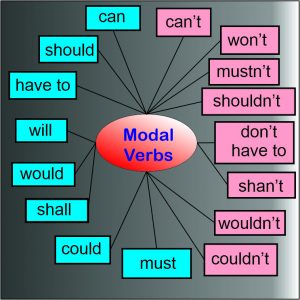Modal Verbs
A modal verb is a type of verb that is used to denote modality, which is used to express: – probability, ability, permission, request, ability, proposal, order, obligation, or advice. Modal verbs always accompany the basic form (infinitive) of another verb that has semantic content.
Basic modal verbs of the English language: can, could, may, might, must, should, should, will, and would. Some other verbs are sometimes, but not always, classified as modal; These include “ought”, “had better” and (in some cases) “dare”, and “need”. Verbs that have only some of the characteristics of the basic modal forms are sometimes called “quasi-modals”, “semi-modals”, or “pseudo-modals”.
| Modal verb | Modal verb meaning | Modal verb example |
| can | to express ability | I can speak a little English. |
| can | to request permission | Can I open the door? |
| may | to express the possibility | I may be late tomorrow. |
| may | to request permission | May I go home, please? |
| must | to express obligation | I must go now. |
| must | to express a strong belief | She must be over 50 years old. |
| should | to give advice | You should stop smoking. |
| would | to request or offer | Would you like a cup of tea? |
| would | in if-sentences | If I were you, I would say sorry. |

More modal verbs Examples
| Modal verbs | Modal verb usages | Modal verb examples |
|
Can |
Ability | I can play the guitar very well. |
| Permission | Can I sit now? | |
| Possibility | It can be a rainy day tomorrow. | |
| Offer | I can help you with this job. Don’t worry! | |
| Request | Can you please pass me the water bottle? | |
|
Could |
Ability in the past | I could play the guitar well when I was 9. |
| Polite permission | Excuse me, could I come in? | |
| Possibility | A hailstorm could come here at night. | |
| Polite offer | No problem. I could give you a help. | |
| Polite request | Could you please move to the next page? | |
|
May |
Permission | May I leave early? |
| Possibility | Scientists may discover a vaccine for coronavirus. | |
|
Might |
Polite permission | Might I take you home? |
| Possibility | I might visit him evening if the weather is nice. | |
|
Must |
Obligation | You must do the homework. |
| Certainty | He must be at school now. He told me about that yesterday. | |
| Mustn’t | Prohibition | You mustn’t play here. It’s dangerous. |
|
Will |
Prediction | The weather forecast predicts that it will rain tomorrow. |
| Promise | I will finish all the homework today. | |
| Spontaneous decision | I will lend you some cash. | |
| Request/ demand | Will you please give me that pen? | |
|
Would |
Used as the past form of “will” | My dad said that he would give me some gifts on my birthday. |
| Polite request/ demand | Would you mind closing the window, please? | |
|
Shall |
Prediction | This time tomorrow I shall be in Japan. |
| Offer/ suggestion | Shall we discuss this further with her? | |
|
Should |
Advice | You should see the doctor. It’s swollen. |
| Prediction/ expectation | The project should be done this weekend. | |
| Polite suggestion | Should I call him to say sorry? | |
|
Ought to |
Obligation | You ought to say good bye to your friends when you leave. |
| Advice | You ought to sleep early. You look really tired. | |
|
Needn’t |
Used to talk about something not necessary | You needn’t give her any advice. She won’t listen. |
